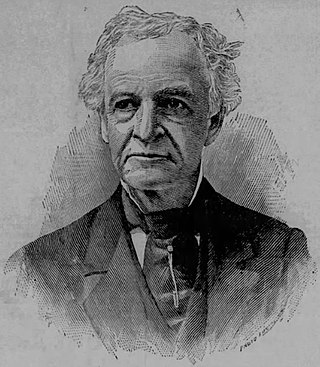
Shelburne is a town in Chittenden County, Vermont, United States. Located along the shores of Lake Champlain, Shelburne's town center lies approximately 7 miles (11 km) south of the city center of Burlington, the largest city in the state of Vermont. As of the 2020 census, the population of Shelburne was 7,717.

Philip Henderson Hoff was an American politician from the U.S. state of Vermont. He was most notable for his service as the 73rd governor of Vermont from 1963 to 1969, the state's first Democratic governor since 1853.

Peter Thacher Washburn was a Vermont lawyer, politician and soldier. A veteran of the American Civil War, he served as the 31st governor of Vermont as a Republican from 1869 to 1870, and was the second Vermont Governor to die in office.

Isaac Fletcher was an American lawyer and politician. He served as a U.S. Representative from Vermont and as Adjutant General of the Vermont Militia.
Thomas Child Jr. was an American lawyer and politician. Originally from Bakersfield, Vermont, he graduated from the University of Vermont in 1838 and became an attorney in Berkshire, Vermont. Child later relocated to New York City, and he was a longtime resident of Staten Island.
Heman R. Smith was a Hinesburg farmer and military officer who served as Adjutant General of the Vermont Militia.
William Weston was an attorney and politician in Burlington, Vermont, and Brooklyn, New York. He served in several local and state offices, and is most notable for his service as a member of the Vermont Senate in the 1850s.

Torrey Eglesby Wales was an American politician who served as the 2nd Mayor of Burlington, Vermont.

John Edward Moran, more commonly referred to as J. Edward Moran, was an American politician who served as the 30th mayor of Burlington, Vermont.
Heman Lowry was a county, state and federal government official in Vermont. He was a delegate to two state constitutional conventions. Lowry was also the longtime sheriff of Chittenden County. In addition, he served twice as U.S. Marshal for Vermont.

Joseph D. Hatch was a Vermont politician and businessman. He was most notable for terms in the Vermont House of Representatives and Vermont Senate, and for serving as mayor of Burlington from 1876 to 1883.
Calvin H. Blodgett was a businessman and politician from Burlington, Vermont. A Democrat, he served as a member of Burlington's board of aldermen and was the city's mayor from 1874 to 1876.
William Barron was a businessman and public official from Bradford, Vermont. He was most notable for his service as Sheriff of Orange County, Vermont and United States Marshal for the District of Vermont (1841-1845).
George W. Barker was an American businessman and public official who served in Vermont and Wisconsin. He is best known for his tenure as United States Marshal for the District of Vermont (1835-1837), Sheriff of Washington County, Vermont (1843-1845), and Judge of Manitowoc County, Wisconsin (1864-1869).
John Pettes was a businessman and public official who was active in Windsor, Vermont. Among the offices in which he served were Sheriff of Windsor County (1837-1839) and United States Marshal for the District of Vermont (1849-1853).
Charles C. P. Baldwin was a government official in Vermont. A Republican, prior to becoming a resident of Iowa in his later years, he served as Sheriff of Orange County, Vermont and United States Marshal for the District of Vermont.

Elliot M. Sutton was a Vermont businessman and politician. A Democrat, among the offices in which he served was mayor of Burlington (1898-1899) and member of the Vermont Senate (1902-1904).

The 1854 Vermont gubernatorial election for governor of Vermont took place on September 5. The Whig nominee was Stephen Royce, former Chief Justice of the Vermont Supreme Court. The Democratic nominee was Merritt Clark, and Lawrence Brainerd ran as the nominee of the Free Soil Party even as he was one of the organizers of the new anti-slavery Republican Party and appeared as a Whig candidate for the Vermont Senate on the ballot in Franklin County. Whig William C. Kittredge was nominated for governor against his wishes by advocates of the Temperance movement and Democrat Horatio Needham also attracted the support of some Free Soil advocates.

John J. Burns was an American politician who resided in Burlington, Vermont. A Democrat, he was most notable for his service as Burlington's mayor from 1939 to 1948.










